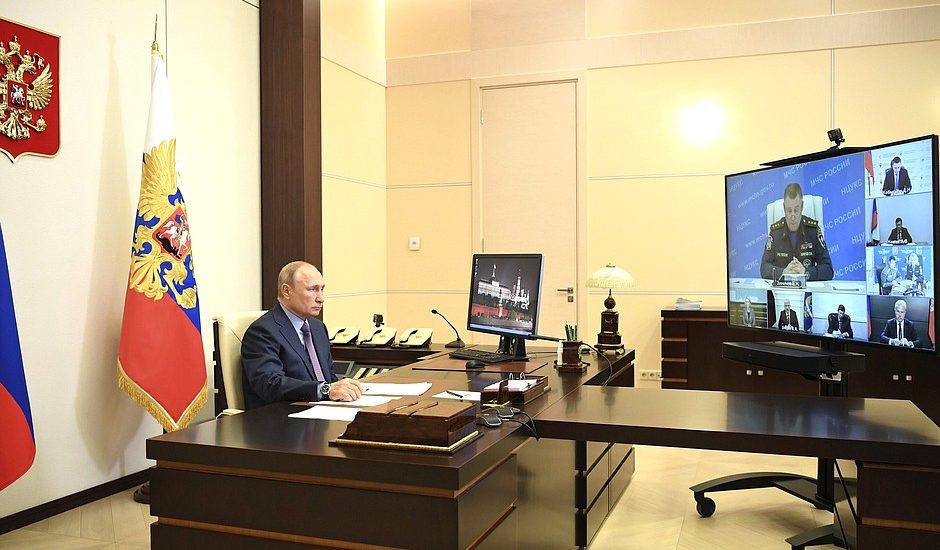President Putin declares state of emergency after major oil leak into Siberian river
- June 8, 2020
- Posted by: Elaine Coles
- Category: Environmental, Russia

Russian President Vladimir Putin declared a local state of emergency last week after 20,000 tons of diesel fuel leaked into the Ambarnaya River in the Krasnoyarsk Territory in Siberia.
Attendees at the high-level meeting included Deputy Prime Minister Viktoria Abramchenko, Minister for Civil Defence, Emergencies and Natural Disaster Relief Yevgeny Zinichev, Minister of Natural Resources and Environment Dmitry Kobylkin, Energy Minister Alexander Novak, Deputy Head of the Federal Service for Environmental, Technological, and Nuclear Supervision Alexei Ferapontov, and Sergei Lipin, director of the Norilsk-Taimyr Energy Company, which owns the facility where diesel fuel spill took place.
The diesel fuel leaked from a damaged reserve tank onto a motor road leading to the TPP-3 thermal power plant in Norilsk. The accident took place on 29th May at the industrial site of the Nadezhdinski Metallurgical Plant and the fuel leaked into the waters of the Daldykan and Ambarnaya rivers.
The company initially tried to localise the consequences of the spill on its own before contacting the Emergencies Ministry. A Marine Rescue Service rescue unit subsequently arrived at the airport on 1st June in Norilsk with eight tonnes of cargo, including oil booms and two tonnes of sorbent.
Measures have now taken to localise the spread of the spill, oil booms have been installed, and work is underway to collect oil products, contaminated water and soil. A group has been formed involving professional emergency response teams, including a 100-strong team from the Siberian Rescue Centre to the emergency area.
Localising the consequences of the spill requires extensive work to collect oil products in the river and adjacent land. Over 100 tonnes of oil products and contaminated soil have already been collected.
Declaration of a federal state of emergency will allow federal resources to be used in relief efforts, with work launched to prevent further negative environmental impacts and to address the key problem of the disposal of the collected oil products.
Vladimir Putin told the meeting he would instruct law enforcement agencies to make a legal assessment of all the actions of officials.
Russian President Vladimir Putin declared a local state of emergency last week after 20,000 tons of diesel fuel leaked into the Ambarnaya River in the Krasnoyarsk Territory in Siberia.
Attendees at the high-level meeting included Deputy Prime Minister Viktoria Abramchenko, Minister for Civil Defence, Emergencies and Natural Disaster Relief Yevgeny Zinichev, Minister of Natural Resources and Environment Dmitry Kobylkin, Energy Minister Alexander Novak, Deputy Head of the Federal Service for Environmental, Technological, and Nuclear Supervision Alexei Ferapontov, and Sergei Lipin, director of the Norilsk-Taimyr Energy Company, which owns the facility where diesel fuel spill took place.
The diesel fuel leaked from a damaged reserve tank onto a motor road leading to the TPP-3 thermal power plant in Norilsk. The accident took place on 29th May at the industrial site of the Nadezhdinski Metallurgical Plant and the fuel leaked into the waters of the Daldykan and Ambarnaya rivers.
The company initially tried to localise the consequences of the spill on its own before contacting the Emergencies Ministry. A Marine Rescue Service rescue unit subsequently arrived at the airport on 1st June in Norilsk with eight tonnes of cargo, including oil booms and two tonnes of sorbent.
Measures have now taken to localise the spread of the spill, oil booms have been installed, and work is underway to collect oil products, contaminated water and soil. A group has been formed involving professional emergency response teams, including a 100-strong team from the Siberian Rescue Centre to the emergency area.
Localising the consequences of the spill requires extensive work to collect oil products in the river and adjacent land. Over 100 tonnes of oil products and contaminated soil have already been collected.
Declaration of a federal state of emergency will allow federal resources to be used in relief efforts, with work launched to prevent further negative environmental impacts and to address the key problem of the disposal of the collected oil products.
Vladimir Putin told the meeting he would instruct law enforcement agencies to make a legal assessment of all the actions of officials.
